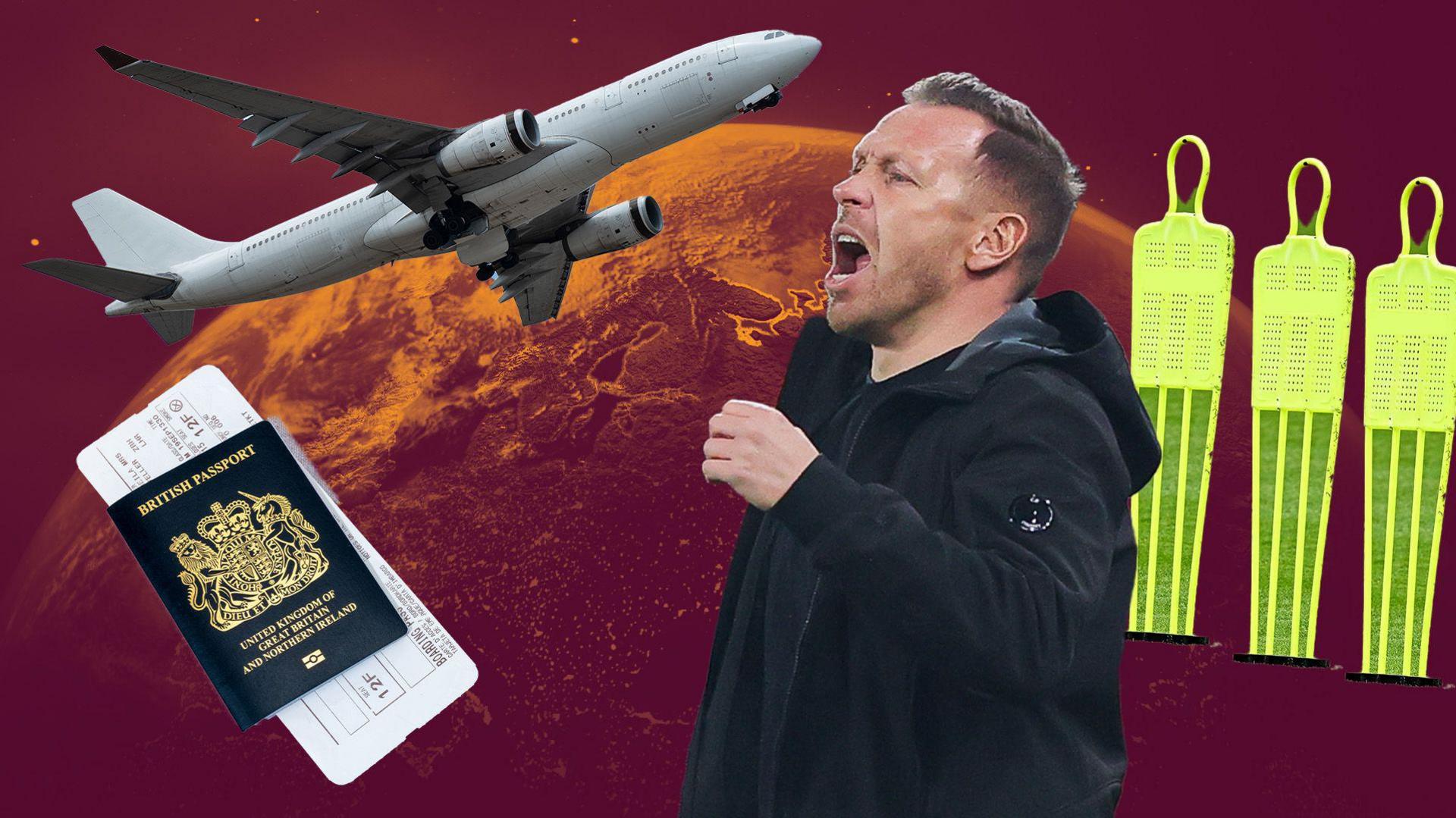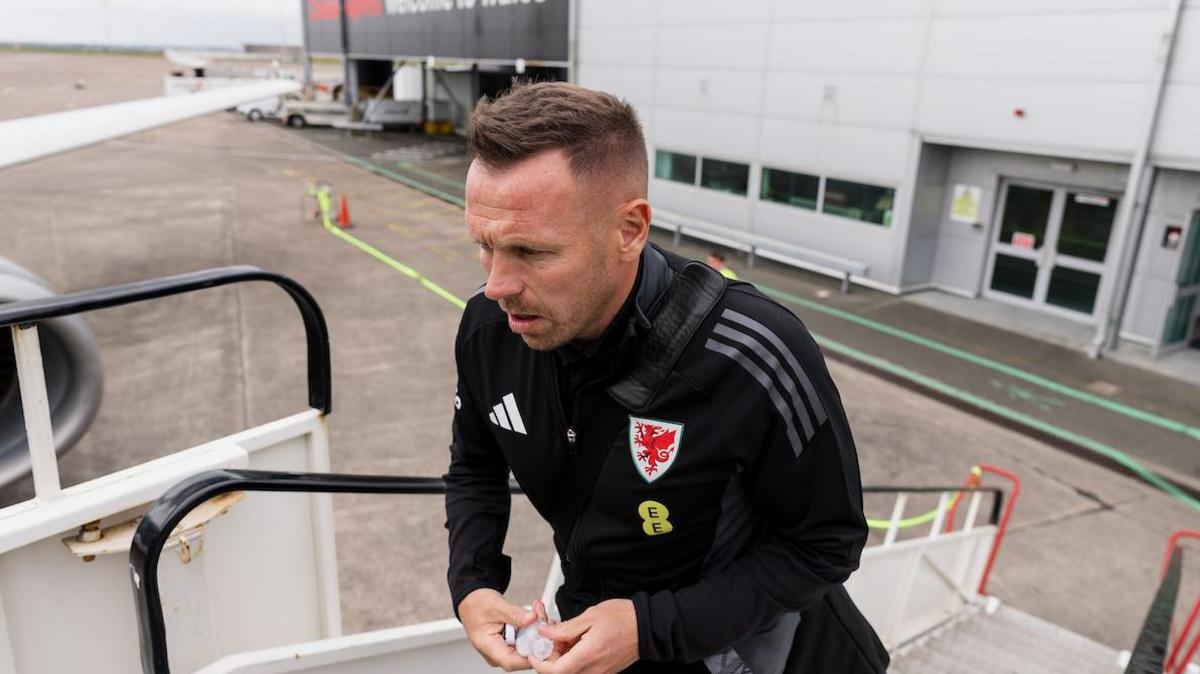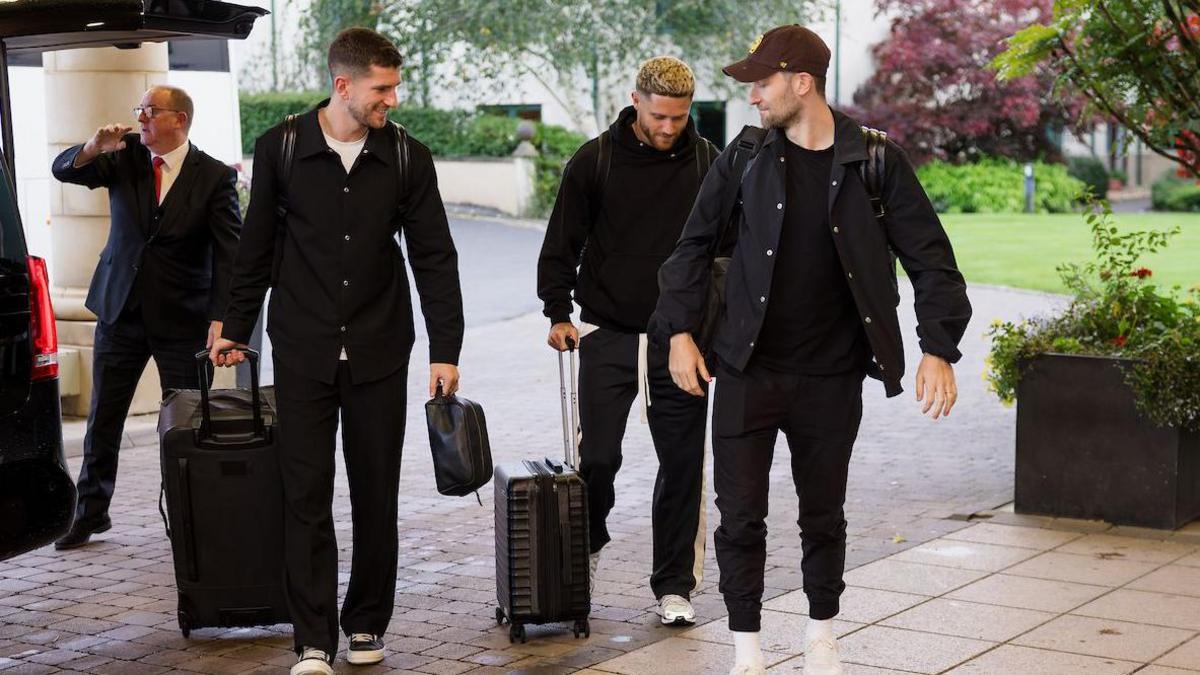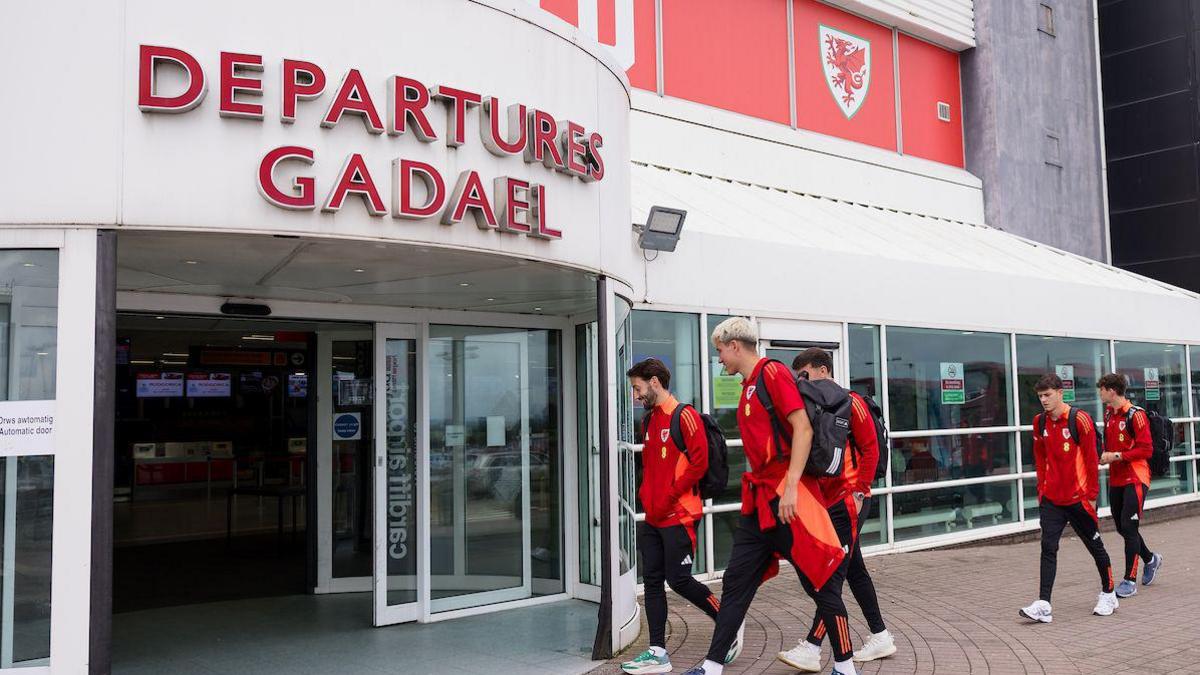Balls, buses and baked beans - how an away qualifier is planned

Wales' men have never travelled to face Kazakhstan before
- Published
World Cup qualifier: Kazakhstan v Wales
Venue: Astana Arena, Astana Date: Thursday, 4 September Kick off: 15:00 BST
Coverage: Live on BBC One, S4C, iPlayer, BBC Radio Wales and Radio Cymru, the BBC Sport website and app, plus live text commentary.
It is arguably the most awkward away fixture in European football.
For Wales, Kazakhstan away means 3,000 miles of travelling across six time zones for a match on an artificial pitch.
But when the end game is World Cup qualification, there is little room for excuses – which means plenty of planning.
Preparation is not only required for far-flung fixtures. The fact is every away day for an international association can be a challenge, with numerous staff members having to painstakingly pull out all the stops to make sure there are no hiccups away from home.
From having the right kind of balls to making sure baked beans are packed in the hold because "other nations cook them differently", there is much that goes in to getting an international team ready for an away fixture.
World Cup 2026 qualifying: Your guide to Kazakhstan v Wales
- Published29 August
'Build him a statue' - Bellamy backs Ramsey after Wales omission
- Published30 August
'We miss him' - Gary Speed Cup honours Wales great
- Published2 September
Nine months to go
With a long road to the World Cup ahead of them, Wales' planning for this qualifying campaign began in the back seat of a car in December 2024.
The draw for the group was conducted in Zurich, with fixtures released as Wales' representatives were travelling home from the airport that evening.
Staff were on standby to put wheels in motion regarding logistics for Wales' away games.
While head coach Craig Bellamy, on the journey home, discusses potential friendly games for blank dates in the qualifying schedule - with the type of opposition required and how to avoid excess travel key factors – others begin making travel arrangements for the qualifiers themselves. Kazakhstan included.
Hotels are a priority, especially with fans also eyeing up rooms. So even with host venues not confirmed for up to 60 days before a fixture, suitable hotels with enough space and function rooms for a national football team are secured, with bookings to be narrowed down at a later date.
Then comes transport, with charter flight options and prices presented.
With Football Association of Wales (FAW) bosses already okaying the cost of business class planes for the entire campaign, arrangements for the lengthy flight to Astana are nailed down after conversations with performance staff about recovery time and training schedules.
With Bellamy keen for players to get sleep, food and recover after the game – and with a five-day break before the carefully selected home friendly against Canada which follows – Wales decide against flying home immediately after the Kazakhstan game.
Ten weeks to go
A hand-picked group of FAW staff make a first trip to Astana, complete with a fine-tooth comb.
Details matter with the aim being to ensure there are no surprises when it comes to game time.
Every nook and cranny of the stadium and hotel is photographed and detailed, from showers and changing rooms to bus drop-off areas.
As well as conditions for the players, potential issues for supporters form part of the fact-finding mission.
Ticketing staff not only assess facilities but count every seat, checking that the number of tickets allocated tallies with what is actually in the stadium, while security advise whether certain seats or areas are actually safe enough to be sold to travelling fans.
Weather, likely traffic, what plug sockets are used, routes for a pre-match team stroll - nothing is left to Google. Every last drop of local knowledge is compiled and readied for the most important meeting of the planning process.
Five weeks to go

Craig Bellamy's team will have limited training time for the Kazakhstan fixture because of the lengthy travel before Thursday's game
Bellamy sits down alongside key coaching staff and all the other departments in the association who are involved in piecing together logistics.
A hefty document armed with information from the reconnaissance trip is pored over with any potential problems raised at this point.
Bellamy's preference of how he likes to shape Wales' schedule around a game week is the basis for all planning, with the non-negotiables long agreed.
But there are commercial activities and media days to factor in. Trips of over four hours mean the preferred option of training at home the day before a game have to be adapted.
Decisions are made on whether to stick to UK time in a country four hours ahead of home, on what type of training will be undertaken on different days, when cameras can be let in for open training, a Uefa requirement. Every hour is accounted for.
Decisions made at this meeting spark a flurry of further activities, such as timings for the vans, coaches and cars needed the other side of Astana airport.
The equipment team – or kit men as they were once more commonly known – have already begun packing, but will now know whether they need to source a ball to match one used by the home association or – as in this case – if extra gear is needed for the pre-match training session at the Astana Arena.
Its artificial surface, for example, means even the usual mannequins which plant into turf have to be swapped for alternatives.
Two weeks to go
Plans for an away trip are signed off with three weeks to go, with a final meeting over squad selection held by Bellamy before the 14-day deadline to inform clubs.
A much-wider pool of players than will be selected has been monitored by medical staff before final emails are sent.
One goes to a player's club with instructions, another to that club's medical staff to keep open communication about the player's likely workload or any information sharing over injury or fitness issue.
Then there is the email to each player with a congratulatory message, an outline of the itinerary and a reminder of informing of changes to passport details. The email for Kazakhstan included a reminder to bring alternate boots for the 4G surface.
A spreadsheet containing the names of the country's best footballers sits waiting for late checks, including which fixture they are involved in over the weekend before camp, whether they are set to be late joining up and whether a car is to be sent to the stadium to collect them ready for international action.
Matchweek

Cars are sent to collect players ready to report for duty, sometimes just hours after playing against each other
After a final sense check of the schedule and plans, camp begins as players walk through the door at the Vale Hotel on the outskirts of Cardiff, where the FAW offices and training ground are also housed.
One by one squad members arrive, handing over a passport to be checked and receiving a room card.
The days of the likes of Chris Gunter and Aaron Ramsey sharing are over, with every player allocated single rooms which are mapped out and planned – though there is scope for players who are particularly close to be housed near one another.
Players have their own WhatsApp group, but another for information and key reminders rolls over from the previous international.
There is no room for sympathy, either, with dropped or injured players removed from that group to prevent sensitive information being leaked by accident.
It is safe to say that in the months after the 2022 World Cup, the words "Gareth Bale has left the group" rammed home the reality of his retirement.
Daily meetings with other departments - from media to medical - are held by Bellamy before breakfast, with each one laying out plans for the day and making sure everyone remains on the same page.
As training begins, an advanced party heads to Astana via Azerbaijan.
As well as a final check on facilities and security, meeting rooms at the hotel are decked in Wales team branding ready for the team's arrival.
Among the early travellers is the team chef, who – after liaising with the performance team – has prepared and sent a menu to the hotel a month prior to arrival.
Menus are adapted if certain produce cannot be sourced or is out of season. Recipe cards are provided if local staff cannot quite get used to making staple foods like porridge at breakfast.
With players' habits and even superstitions in mind, extensive options for food the day before a game and in the final hours before a match are provided - including those baked beans.
Travel

Wales have avoided the difficulty faced by some fans travelling to Kazakhstan by arranging a direct charter flight from Cardiff
The final kit is loaded with more than 60 pieces of luggage, now including a coffee machine if the local brew is deemed not up to scratch, widescreen televisions for half-time analysis if not provided, sponsors backdrops for media, physio beds and the all important dressing room stereo. All ticked off, nothing left to chance.
On landing, players are picked up in one bus and whisked straight to the hotel for rest.
A second bus remains for staff who wait for luggage, which will then be used to turn function rooms and bedrooms into physio areas and kit rooms. A heat press for printing shirt numbers is also part of the cargo.
A last check on players comes before, at 23:00 Central European Time on the eve of a game (or matchday minus-1 in Uefa-speak), a final squad list of 23 is submitted on Uefa's registration portal, locking in the group who will take to the field the following day.
It is only then, after nine months of planning, that it all comes down to the relatively straightforward business of 90 minutes of football.